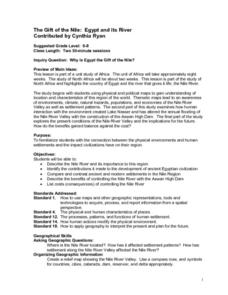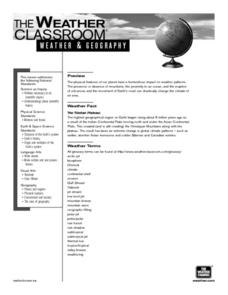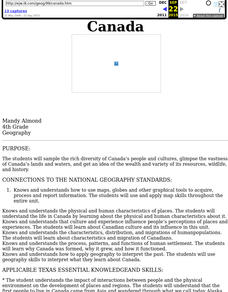Curated OER
Oil: The Problem or Solution to the World's Economic Future
Young scholars map the major oil producing and consuming countries and regions. They identify current and future topographic and political problems that could affect the production and transportation of oil.
Curated OER
Crude Conversation
Middle schoolers analyze text and maps in determining the effect the world's energy resources have on human society, and make charts illustrating at least three ways each resource makes life easier for human society.
Curated OER
Rain Forests: A Disappearing Act?
Students examine and locate rainforests on maps, and research the patterns of their destruction. They develop a bar graph of rainfall and temperature data, write a journal entry, and research the people, animals, and plants/products of...
Curated OER
The Tennessee River: The Tie That Binds
Seventh graders examine the Tennessee River to see why it is still a major transportation artery in lieu of the age of modern transportation such as interstate highways, air cargo, and elaborate railway systems.
Curated OER
King Cotton
Fifth graders explore the cotton plant. In this cotton lesson, 5th graders research the process of growing cotton. Students explore the economic and cultural differences in the states that grew cotton for trade and industry.
Curated OER
The Gift of the Nile: Egypt and its River
Students begin with a piece of a puzzle that shows an artifact from ancient Egypt. They find others who have pieces that go with their puzzle piece. Students work in these groups to construct a relief map of the Nile River Valley.
Curated OER
Africa - Clothing
Third graders discuss the differences between the clothing choices within the three regions in Africa and in Hawaii.
Curated OER
Environment -- Unit on Globalization and the Environment
Students examine the effect of human activities on the environment. They discover issues that are causing problems around the world. They participate in a debate using their own research.
Curated OER
Renaissance Trade and Exchange
Sixth graders map out trade routes. In this Renaissance time period lesson, 6th graders complete a Christopher Columbus Map Activity, discuss and identify the parts of a map, and locate Asia, Europe and the Middle East. Students...
Curated OER
Modern Japan Unit Plan
Sixth graders research modern Japanese culture, society and traditions, examine relationship between Japanese culture and its environment,
compare and contrast Japanese Society with Canadian Society, compare lives of people in Japan with...
Curated OER
Water: From Neglect to Respect
The goal of this collection of lessons is to make middle schoolers more aware of the ways in which they are dependent upon water to maintain their standard of living. Learners compare water use in Lesotho to water use in the United...
Population Connection
The Human-Made Landscape
Agriculture, deforestation, and urbanization. How have human's changed the planet and how might we mitigate the effects of human activity on the planet? To answer these questions class members research the changes in human land use from...
Curated OER
The Tibetan Plateau
Learners discuss the characteristics of the biosphere, with a focus on the Tibetan Plateau. They participate in a question and answer period discussing biomes and climate patterns. They compare and contrast different ecosystems.
Curated OER
Past, Present and Future Through the Eyes of Long Jakes
Even the littlest learners can become art historians if they have the right training. For the lesson, your preschoolers discuss the piece Long Jakes as they point out all the details they notice. They discuss what mountains and mountain...
Green Education Foundation
How Loud is Too Loud?
Ever wonder how loud a sound has to be to cause damage? Young scientists explore sound properties by researching decibel levels. They discuss how sound is perceived by our ears and our brains and why it can cause negative health effects...
Curated OER
Kosovo: A Thousand Year Old Border Conflict
Learners present proposals and negotiate with other representatives to bring lasting peace to the area through a simulated "Summit Conference."
Curated OER
Men of Steel
Students explore early 20th century steel making. For this U.S. history steel making lesson, students view and describe a postcard and a picture depicting exaggerated aspects of the steel industry. Students listen to a poem about Joe...
Curated OER
Living in the Desert
Conduct an investigation on the plants used by the Hohokam tribe. To survive in the harsh desert environment the Hohokam used many natural resources. Learners read, research, map, and graph multiple aspects of Hohokam plant use as a...
Curated OER
Check Out Community Preparedness
Students research storm preparedness in local community, identify ways citizens are notified of impending weather emergencies, contact city administrators to discuss disaster plan and whether it has ever been implemented, and interview...
Wild BC
Carbon Sinks and Sources
Earth or environmental science pupils are assigned to be carbon sources or sinks. They ask yes-or-no questions to try to figure out which one they are. Then they discuss ways people can have positive effects on the changing climate by...
Curated OER
Because We Can, Should We?
Students identify a position on an issue of geographic importance and support it They read the story "By the Waters of Babylon," and write a paragraph explaining what they think the relationship between Babylon and the Biblical referene...
Curated OER
Canada
Fourth graders sample the rich diversity of Canada's people and cultures, glimpse the vastness of Canada's lands and waters, and get an idea of the wealth and variety of its resources, wildlife, and history.
Curated OER
Digging, Smelting and Forging: But Why in Pennsylvania
Students examine the history of the iron industry in Pennsylvania. In this iron industry lesson plan, students learn about Israel Acrilius and his role in the iron industry. Students identify natural resources used in forging iron....
Curated OER
Breaking Up is Hard To Do
Students study the geographical issues related to the conflict in the Caucasus while identifying and discussing other key issues. They investigate methods of conflict resolution while analyzing both sides of the conflict including those...

























